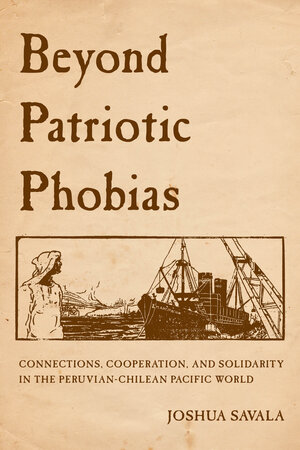By Joshua Savala, author of Beyond Patriotic Phobias Connections, Cooperation, and Solidarity in the Peruvian-Chilean Pacific World
As an undergraduate I did a summer abroad in Cusco, Peru followed by a semester at the Universidad de Concepción in Chile. People in both countries occasionally made jokes about the other, almost all of which were less biting critique or xenophobic than casual comments. But it always seemed that there was something beyond the one liners. When I started to dig into the scholarship, it struck me that the War of the Pacific (1879-1883) acted as the structuring event in the modern history of both countries, with conflict at the center. While certainly a reality, conflict—I told myself—could not be the only way of telling this history, could it?
Beyond Patriotic Phobias is my push to rethink this narrative of antagonism. Labor and working-class history is at the core of my interest, and that is where the project began. Maritime and port workers, especially those aligned with anarcho-syndicalism, lived and labored in a cosmopolitan Pacific world. Some did see and even engage in nationalist discourses. But many also had no interest in the nationalism of the day, and some analyzed it as just one more strategy by the state to divide the working class, making revolution that much more difficult. Addressing fellow Chilean workers in November 1924, one anarchist wrote that it was time to show their Peruvian comrades that “patriotic phobias have not contaminated us.” This was the politics that animated radical workers along the coasts of Peru and Chile to organize around both local and transnational issues.
Of course, maritime and port workers were not the only ones engaged in this type of thinking and acting. As I read reports from port cities, I started to read more and more about cholera in the 1880s. I followed letters from different institutions within Chile and Peru and medical journals and finally came across the case of Dr. David Matto. Born in Cusco, Matto would be sent to Chile to investigate the spread of cholera. His published letters back to Peru revealed some of the intricacies of the Chilean state’s response to the epidemic, useful information for thinking about the history of medicine, of which there is plenty in the book. The letters also showed that he worked closely with Chilean doctors, spending time in the same laboratories and looking through the same microscopes, and in the process built what I call a science without a nation.
Beyond Patriotic Phobias builds parts of the South American Pacific to argue in favor of a more collaborative history. In addition, I also take time to think through laboring in the Pacific, constructions of masculinity and sexuality, and the history of policing. These are all parts of the equation required for understanding the transnational and oceanic history of Peru and Chile.
